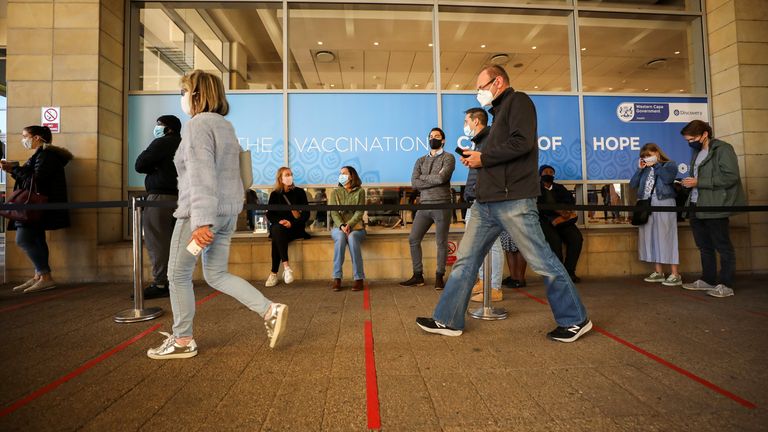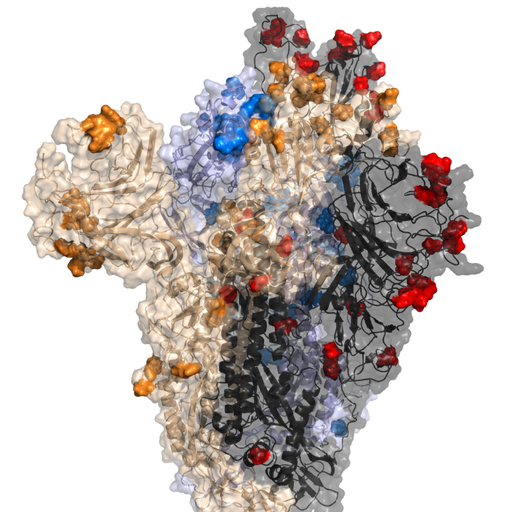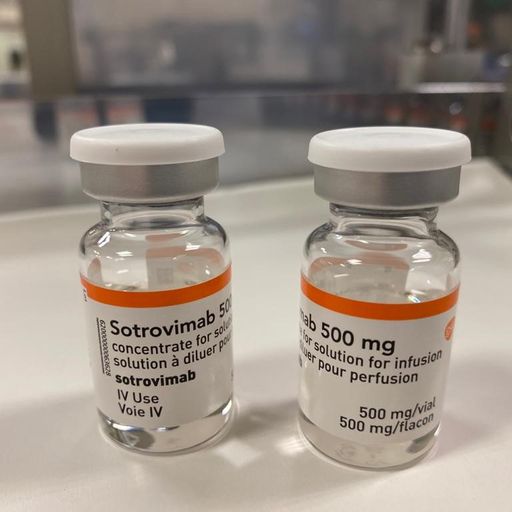COVID-19: Omicron has 'substantial' ability to evade immunity from previous coronavirus infection
Researchers at the National Institute for Communicable Diseases (NICD) warn their finding has important public health implications.
Friday 3 December 2021 10:29, UK
Omicron has a "substantial" ability to evade immunity from a previous COVID infection, according to the first real-world study of the variant's effect.
The finding suggests the new variant could cause a substantial wave of infections, even in populations with high levels of antibodies.
Researchers at South Africa's National Institute for Communicable Diseases (NICD) warn their finding has important public health implications.
Ireland delays imposing travel restrictions - latest COVID updates
They add: "Urgent questions remain regarding whether Omicron is also able to evade vaccine-induced immunity and the potential implications of reduced immunity to infection on protection against severe disease and death."
The scientists looked at almost 2.8 million confirmed cases of COVID-19 in South Africa since March 2020 and found 35,670 were reinfections.
The risk of a reinfection was lower in the Beta and Delta waves than the first surge of cases in March 2020 that was caused by the Wuhan strain of the virus.
But significantly, they found the risk of reinfection in the current Omicron wave is 2.4 times higher than in the first wave.
The results have been published as a pre-print on the MedRxiv server and have not been peer reviewed.
The researchers say: "We find evidence of a substantial and ongoing increase in the risk of reinfection that is temporally consistent with the timing of the emergence of the Omicron variant in South Africa, suggesting that its selection advantage is at least partially driven by an increased ability to infect previously infected individuals.
"Immune escape from prior infection, whether or not Omicron can also evade vaccine derived immunity, has important implications for public health globally."
Professor Paul Hunter, of The Norwich School of Medicine, University of East Anglia, said: "The implications of this paper are that Omicron will be able to overcome natural and probably vaccine induced immunity to a significant degree.
"But, the degree is still unclear, though it is doubtful that this will represent complete escape.
"The other big uncertainty is whether this increases the risk of severe disease, hospital admissions and deaths.
"With previous variants, epidemiological studies showed that protection against severe disease from other variants was better maintained than protection against infection."
Although only around a quarter of the population in South Africa is fully vaccinated, immunity from natural infection is high because the country has had several large waves of COVID.
Earlier, the World Health Organisation (WHO) said it will deploy a surge team to South Africa to help deal with the variant outbreak.
The team will be sent to Gauteng province to help with surveillance and contact tracing.
However, Barry Schoub, chair of the South African government's committee on COVID vaccines, told Sky News initial signs were "good news".
Follow the Daily podcast on Apple Podcasts, Google Podcasts, Spotify, Spreaker
"Certainly, at this stage, the news does look to be promising - the great majority of the breakthrough infection (in other words, individuals that have had infection despite vaccination) is mild.
"Our hospital surveillance is showing a little bit of an uptick but certainly nothing as dramatic as we've seen in the previous waves."
Your Omicron questions answered: Watch a special programme with COVID experts on Sky News at 7pm






